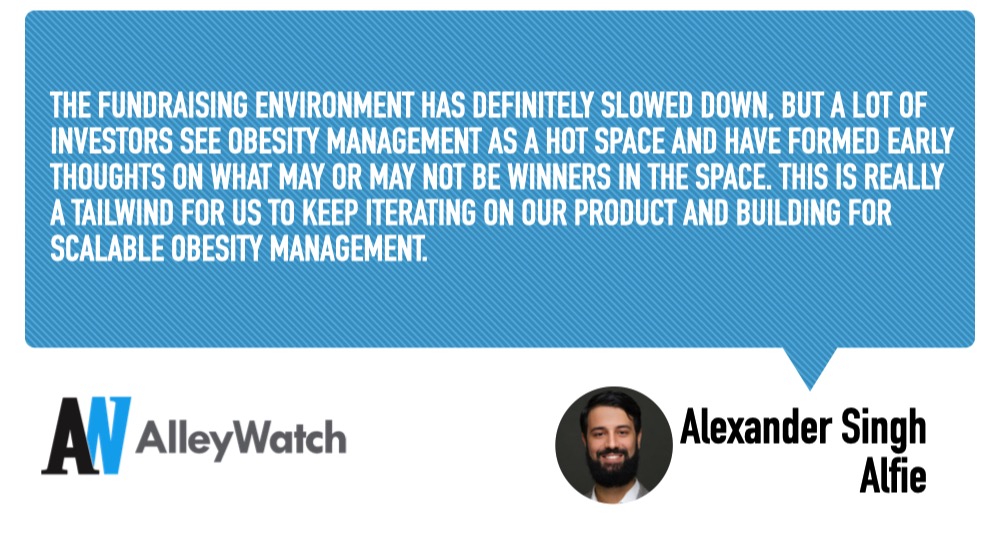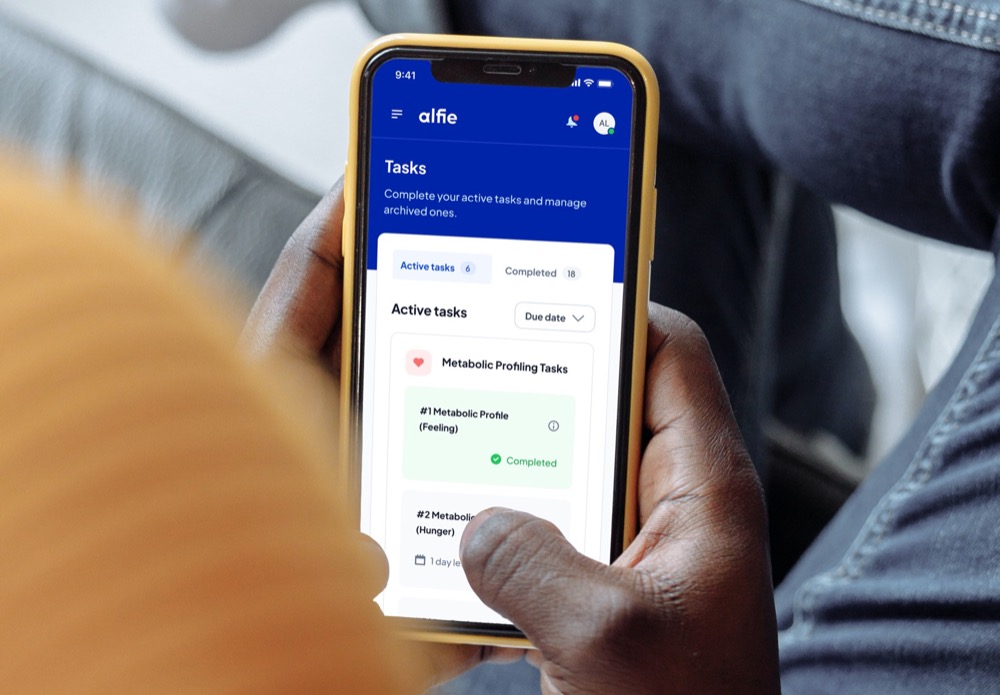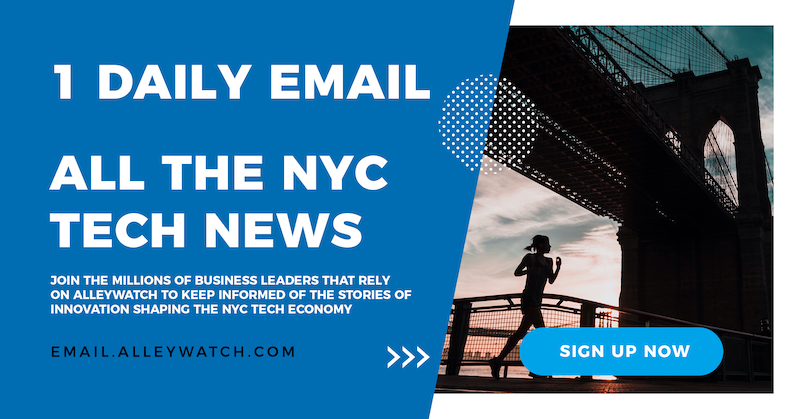42% of Americans are suffering from obesity. Every single state in the union has at least a 20% prevalence of obesity within its population. It’s estimated that the cost of chronic conditions linked to obesity like heart disease, diabetes, stroke, and certain types of cancers exceeds $1.76T per year. Alfie is a virtual weight management platform that blends AI, telehealth, and behavioral change to drive sustainable weight loss. Employing a holistic approach, the platform develops an initial treatment protocol based on a robust metabolic profile to understand why patients gain and hold onto weight. With this assessment, Alfie’s ObesityRx system, a clinical decision support tool, leverages AI to develop a combination of precision medicine and behavioral change. A cohort of 300 patients lost an average of 10-15% of their body weight in 9 months using Alfie; these results are comparable to those using trendy drug injections like Ozempic, which are GLP-1 (glucagon-like peptide-1) based.
AlleyWatch caught up with Alfie CEO Alexander Singh to learn more about the business, the company’s strategic plans, recent round of funding, and much, much more…
Who were your investors and how much did you raise?
We raised $2.1M led by Nina Capital and Y Combinator, with participation from Goodwater, Phoenix Fund, and angels including one of the founders of Opentrons.
Tell us about the product or service that Alfie offers.
Alfie Health is a virtual obesity management clinic, which uses its proprietary AI clinical decision support technology to recommend a combination of precision medicine and behavioral change to help patients sustainably lose weight. Alfie provides ongoing medical supervision and support via regular telehealth visits.
Developed with input from obesity specialists from Mass General and the Cleveland Clinic, the proprietary ObesityRx™ system utilizes AI to conduct a metabolic profile of patients to understand why they gain and hold on to weight. The system makes precision medicine recommendations (GLP-1s are often NOT the primary medication), as well as suggestions for behavioral changes. Alfle’s team of specialists and coaches provide ongoing telehealth support. All treatment recommendations are reviewed by Alfie’s medical team.
What inspired the start of Alfie? My cofounder Rohit Rustagi and I met through our undergrad thesis, where Hasan Syed, MD, our third cofounder, was our thesis advisor and always had a passion for applying scalable technology to healthcare.
My cofounder Rohit Rustagi and I met through our undergrad thesis, where Hasan Syed, MD, our third cofounder, was our thesis advisor and always had a passion for applying scalable technology to healthcare.
During the pandemic, I was working at the FDA and started to see new anti-obesity medication options. I grew intrigued by the data around these medications and reconnected with Rohit, who at the time was on his way to Stanford Medical School. We had both seen the impact of obesity (both personally with family) as well as in practice, as our third cofounder, Hasan Syed is a surgeon and saw the risks of obesity and how it can cause debilitating diseases. It can also prevent life-changing procedures due to the heightened risk of complications.)
How is Alfie different?
At Alfie, we leverage technology to determine the right treatment at the right time for each one of our patients.
Our clinical decision support system, ObesityRx leverages advanced AI algorithms to review a patient’s medical history; lab data; vitals via remote monitoring and patient-reported outcomes (PROs) that address satiety, satiation, and other aspects of metabolism to determine a patient’s personalized metabolic profile.
The platform then makes an initial treatment recommendation for each patient based on their unique metabolic profile. The analysis includes lifestyle change (nutrition, exercise, sleep, etc.) and medications alone or in combination when appropriate such as phentermine, topiramate, naltrexone, bupropion, metformin, and more—in addition to GLP-1s.
In an internal cohort of 300 patients, we showed an average of 10 to 15 percent weight loss—similar to the results of GLP-1s—by adhering to Alfie Health’s holistic approach.
What market does Alfie target and how big is it?
Our focus is on patients with more severe obesity (BMI of 35+) who in many cases also have multiple other chronic conditions. This alone constitutes a $156B market opportunity in the United States.
What’s your business model?
We engage channel partners to support patients that otherwise may not be treated for obesity, or be given improper advice to manage their obesity.
We are currently working with a large cardiology group to manage weight loss for a number of its patients with obesity as well as a large enterprise client referring appropriate patients to Alfie.
How are you preparing for a potential economic slowdown?
We are focusing on creating a strong pipeline of channel partners to target profitability as fast as possible, and minimizing unnecessary spending.
What was the funding process like?
The fundraising environment has definitely slowed down, but a lot of investors see obesity management as a hot space and have formed early thoughts on what may or may not be winners in the space. This is really a tailwind for us to keep iterating on our product and building for scalable obesity management.

What are the biggest challenges that you faced while raising capital?
The biggest challenge we faced was keeping our heads up when hearing “no”s from investors. It took a mindset shift to really view it as a “not now.” “No” doesn’t mean a “no” forever. This helped us keep investors’ feedback in mind as we iterated on the product in the background.
What factors about your business led your investors to write the check?
At this stage, I think investors were primarily motivated by our team. Unrelated to our teams’ strengths across AI and healthcare, and our backgrounds from top institutions, we were able to show investors that we are focused on long-term strategy for scaling this business and have the ability to adapt to the market and pivot when and where needed.
On top of that, our two biggest differentiators are our technology-driven approach and our business model. The way we apply AI technology to support clinics and other healthcare organizations in treating patients with obesity helped convince investors that we had a technology that would be valuable and worth scaling.
What are the milestones you plan to achieve in the next six months?
Over the next six months, we will focus on continuing to scale channel partnerships with clinics and other healthcare organizations.

What advice can you offer companies in New York that do not have a fresh injection of capital in the bank?
Network. Network. Network. The biggest breakthroughs we’ve had are at the advice of other founders, healthcare leaders, and advisors. Even investors who have not invested in Alfie have provided critical introductions and support for the company. You can build a great product, but often customers will not come. Utilizing and growing your network is instrumental to creating ongoing success.
Where do you see the company going now over the near term?
In the near term, as I mentioned previously, we’re really doubling down on growing partnerships. We’ve proven to early partners that we’ve created a scalable, technology-driven, and holistic approach to properly managing a patient’s obesity and will leverage these results to grow.
What’s your favorite summer destination in and around the city?
In the few spare moments I do have, I like to head out to Rockaway Beach to surf!
You are seconds away from signing up for the hottest list in Tech!
Sign up today
- SEO Powered Content & PR Distribution. Get Amplified Today.
- PlatoData.Network Vertical Generative Ai. Empower Yourself. Access Here.
- PlatoAiStream. Web3 Intelligence. Knowledge Amplified. Access Here.
- PlatoESG. Automotive / EVs, Carbon, CleanTech, Energy, Environment, Solar, Waste Management. Access Here.
- BlockOffsets. Modernizing Environmental Offset Ownership. Access Here.
- Source: https://www.alleywatch.com/2023/07/alfie-obesity-weight-management-clinic-virtual-telehealth-platform-alexander-singh/




